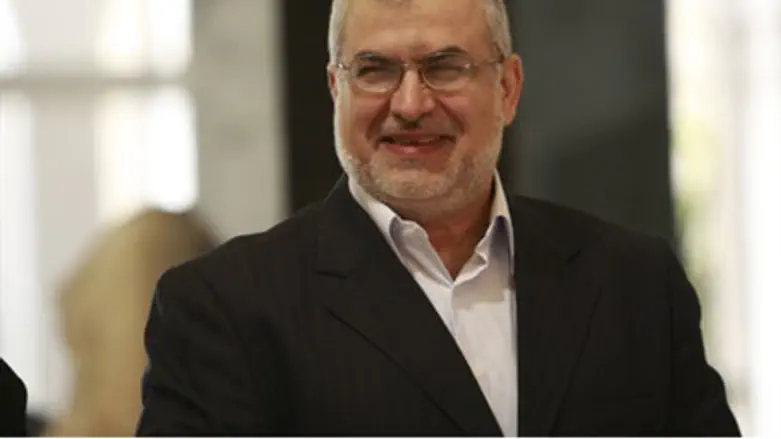
Hizbullah warned Sunday its patience was wearing thin with the opposition March 14 campaign against the terror organization’s militias and munitions, saying it would act to 'foil attempts to destabilize the country.'
Senior Hizbullah officials, including State Minister for Administrative Reform Mohammad Fneish and MP Mohammad Raad, head of Hizbullah’s parliamentary Loyalty to the Resistance bloc, attacked the March 14 campaign against the Hizbullah-backed government of Prime Minister Najib Mikati.
“There is a backed opposition which has its subversive plan in the country and raises slogans that are in tune with the foreign policies which the outside [world] wants for Lebanon," Raad said.
“We say in all frankness: Those who aim to disarm the resistance and tarnish its [image] are part of the machine that serves the American-Israeli project in order to dominate Lebanon and bring it back under Israeli occupation,” Raad told a rally in the southern village of Kfarfila.
“Those do not know the value of the resistance … Therefore, they do not know the meaning of sovereignty and freedom at all,” Raad said, adding: “The only sovereignty they understand is an American sovereignty over our country so that they can gain a [government] seat that can protect their interests and their companies.”
March 14 politicians have repeatedly accused Hizbullah playing havoc with the country’s security and stability by insisting on keeping its arms and refusing to cooperate with the UN.-backed Special Tribunal for Lebanon probing the 2005 assassination of statesman Rafik Hariri.
Led by former Prime Minister Sa'ad Hariri - the assassinated leader's son - March 14 parties have repeatedly called for the disarmament of Hizbullah and shunned President Michel Sleiman’s recent call for national dialogue on a national defense strategy.
Hariri and his March 14 allies have maintained that the talks should focus solely on the issue of Hizbullah’s arms and militias - which are stronger than the Lebanon's military - make it impossible for the government in Beirut to exercise independent sovreignty without Hizbullah's consent.
Raad warned the March 14 parties that Hizbullah’s patience and tolerance with their vehement campaigns have limits.
“We say there are some people who are taking advantage of our patience and forgiveness, but these have their limits … As long as we are able to maintain the unity and strength of our country with our patience, we will remain patient,” Raad said, adding: “However, if we see a hand extending from the outside into the country, we will cut it off.”
Hizbullah officials and their March 8 allies have accused the March 14 parties of counting on the collapse of the regime of Syrian President Bashar Assad as a result of the popular uprising as a chance to reclaim power in Lebanon after Hariri’s Cabinet was toppled by the Syrian-backed March 8 alliance in January.
Sheikh Nabil Qaouk, deputy head of Hizbullah’s Executive Council, accused the March 14 parties of betting on the unrest taking place in Syria in order to return to power - and serving Western interests.
“The March 14 team’s latest sins against the country are that they are part of the aggression on Syria. They are today a dagger stabbing Syria in the back to serve the American project in the region,” Qaouk told a ceremony in the southern town of Toulin. “This team is betting on its return to power through the Syrian crisis. But it will reap only frustration and repentance.”
That long-term opposition Hizbullah, a terrorist group founded on the rhetoric of 'resistance,' finds itself rattling its sabers at an opposition movement that wishes to resist its influence in the country has not been lost on political commentators, who note Hizbullah's backing of of President Bashar Assad in Damascus has opened the group to sharp criticism and charges of hypocrisy.
Meanwhile, Mikati returned to Beirut Sunday from Paris, where he attended an international conference on Libya following the collapse of Libyan leader Moammar Qaddafi's regime.
While in Paris, Mikati caused a stir in Beirut when he said in an interview with Al-Hayat newspaper that Lebanon would continue financing the STL.
Lebanon has not yet paid the 49 percent share of the court’s funding for 2011, amounting to $65 million, which it is obliged to pay under the U.N. Security Council resolution that established the STL.
The STL has created waves in Lebanon’s political landscape, particularly after the tribunal indicted four Hizbullah members for involvement in Hariri’s killing. The Hizbullah-led March 8 alliance has rejected the tribunal, describing it as a conspiracy against the country.
Hizbullah has demanded the government to sever ties with the STL, halt funding and withdraw Lebanese judges -- leading the opposition to charge the terror organization with trying to legitimize political assassination.
But the terror organization's March 14 opponents have proven they intend to keep the pressure on and are not easily cowed.
That 'resistance' leader Hassan Nasrallah may find himself cast in the role of an Arab strongman ordering a violent crackdown on dissidents in Lebanon's streets is just another irony of the Arab Spring.